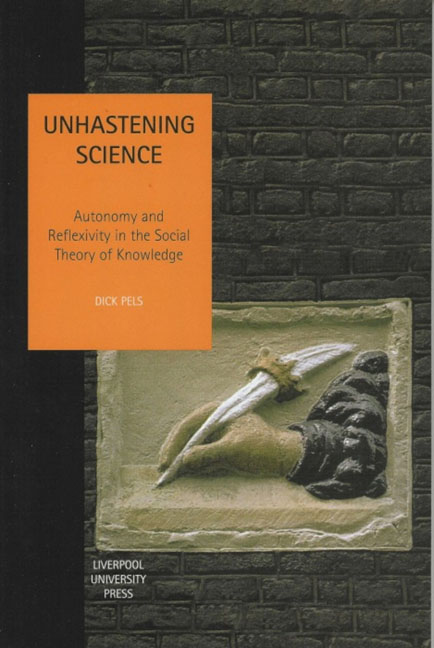Book contents
- Frontmatter
- Dedication
- Contents
- Acknowledgments
- 1 The Timescape of Science
- 2 What (Again) is So Special about Science?
- 3 Two Traditions in the Social Theory of Knowledge
- 4 The Natural Proximity of Facts and Values
- 5 Knowledge Politics and Anti-Politics: Bourdieu on Science and Intellectuals
- 6 The Politics of Symmetry
- 7 Reflexivity: One Step Up
- 8 Intellectual Autonomy and the Politics of Slow Motion
- Epilogue: Weak Social Theory
- Notes
- Bibliography
- Index
5 - Knowledge Politics and Anti-Politics: Bourdieu on Science and Intellectuals
- Frontmatter
- Dedication
- Contents
- Acknowledgments
- 1 The Timescape of Science
- 2 What (Again) is So Special about Science?
- 3 Two Traditions in the Social Theory of Knowledge
- 4 The Natural Proximity of Facts and Values
- 5 Knowledge Politics and Anti-Politics: Bourdieu on Science and Intellectuals
- 6 The Politics of Symmetry
- 7 Reflexivity: One Step Up
- 8 Intellectual Autonomy and the Politics of Slow Motion
- Epilogue: Weak Social Theory
- Notes
- Bibliography
- Index
Summary
Autonomy and Duality
In this chapter, my aim is to engage more directly with Bourdieu's field theory of science and his notion of the intellectual ‘politics of reason’, which supply intriguing thought material for a further elaboration of a pragmatic, knowledgepolitical conception of intellectual autonomy. Similarly to Latour's theory of translation, Bourdieu's field theory relativizes the science/politics divide, but does not satisfactorily resolve the conundrum of fact and value. However, while Latour defends the view that the purpose and strength of scientific laboratories is precisely to erode the differences between science and society, Bourdieu continues to profess a principled loyalty to the idea of scientific and intellectual autonomy. Indeed, his approach positions the concept of autonomy so centrally that it virtually performs as a sociological deputy of more traditional criteria of truth and rationality: professionalism and autonomy go far towards defining the specificity of the intellectual and scientific fields in their most authentic state. In this respect, and in critical abnegation of the de-differentiation as proclaimed by radical constructivists and ‘nothing-specialists’, Bourdieu maintains a principled distinction between an ‘external reading’, which thematizes the incorporation of science in the wider social cosmos, and an ‘internal reading’, which is oriented towards the concatenation of knowledge and (symbolic) power inside the scientific microcosmos itself (e.g. 1990b: 298).
Before entering upon a discussion of Bourdieu's perspective, however, I first need to clarify my usage of the protean concept of ‘intellectual’ and its relation to adjacent concepts such as ‘professional’, ‘expert’, and ‘academic scientist’. First, it makes little sense to hope for objective definitions of any of these categories by means of enumerative or ‘finger-pointing’ exercises. All definitional portraits of intellectuals, professionals, experts, and scientists are simultaneously self-portraits, often attempts to delineate a cherished identity, and hence liable to entail claims that are essentially knowledge-political in nature. For Bourdieu, the very definition of intellectuals, scientists, and professionals is itself continually at risk and at stake in struggles within intellectual, professional, and scientific fields. Secondly, following the lead of Feyerabend, Foucault, and Bourdieu himself, I shall refrain from drawing any hard-and-fast demarcation lines between intellectuals and professionals or scientific experts.
- Type
- Chapter
- Information
- Unhastening ScienceAutonomy and Reflexivity in the Social theory of Knowledge, pp. 108 - 129Publisher: Liverpool University PressPrint publication year: 2003



